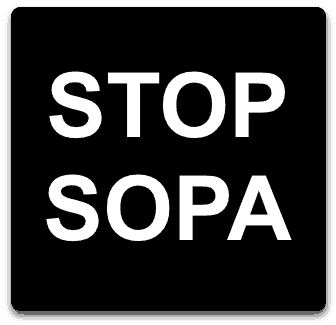
Phillip Dampier
Sometimes you have to wonder if some people have no shame. Former Sen. Chris Dodd, who now collects a fat paycheck as chairman of the Motion Picture Association of America, has his fur in quite the ruffle this morning, upset to learn thousands of websites have voluntarily gone offline in a one day protest against proposed copyright legislation bought and paid for by the industry he now represents.
“Some technology business interests are resorting to stunts that punish their users or turn them into their corporate pawns, rather than coming to the table to find solutions to a problem that all now seem to agree is very real and damaging,” Dodd said in a statement.
Corporate pawns? The irony of Dodd’s use of the revolving door between his public office and the special interests he used to oversee (and now earns a living from), was lost on him. So was the fact the MPAA and its recording industry cohort the RIAA have spent the past several years alienating consumers extorting settlements out of those presumed guilty, under threat of being sued for much more. With years of overreach and customer alienation under their belts, pardon America if they suspect Hollywood’s latest anti-piracy plan is more of the same.
Dodd served the people of Connecticut when the music and movie industry began a series of crackdowns on content theft that did more harm than good. This is the industry that fought the right of consumers to record TV shows on home VCR’s for later viewing, wanted to tax blank media, raised prices on CD’s and DVD’s to the point it fueled piracy, for years refused to license legal online content in ways that would have undercut piracy, imposed “digital rights management” technology that effectively curtailed fair use of content consumers purchased for themselves, and sued customers it suspected of stealing — innocent or otherwise.

Dodd
But Chris Dodd doesn’t work for the American people any longer. He works for giant corporate studios and now represents their interests.
Dodd is especially upset because the Stop SOTA protests may actually be effective at shutting down the railroading of the so-called “Stop Online Piracy Act” through Congress.
“It is an irresponsible response and a disservice to people who rely on them for information… A so-called ‘blackout’ is yet another gimmick, albeit a dangerous one, designed to punish elected and administration officials who are working diligently to protect American jobs from foreign criminals,” said Dodd.
The industry has spent millions trying to position their legislation as a solution to shady offshore counterfeiters and content thieves, but the bill’s most significant provisions hit much closer to home.
The proposed legislation would allow the Department of Justice and content owners to seek court orders against any site accused of “enabling or facilitating” piracy. Since America’s long arm of justice can reach only between the states of Hawaii and Maine, this most important provision of the proposed bill would do little to curtail those “foreign criminals.”
SOPA also demands that search engines censor themselves to remove anything Hollywood suspects of infringing copyright from search listings. As the Electronic Frontier Foundation has documented for years on its Chilling Effects project website, such powers have already been used within the scope of the Digital Millennium Copyright Act to wipe out listings that just reference copyrighted works, occasionally even by third parties that have no real standing to file the complaint. At least websites responding affirmatively to DMCA complaints are protected from unknowingly violating copyright law. Under SOPA, those protections are bypassed, potentially making even innocent infringement liable for civil action and search engine blocking.
Much of the enforcement, likely encouraged by companies Dodd now represents, will be done at the behest of Hollywood studios and other deep pocketed content producers. Ultimately, most of the impact will be felt by consumers suspected of “infringing,” many who effectively lack the financial resources to prove their innocence.
Any web publisher would need to think twice about publishing anything online, if only because the financial risks of defending oneself against alleged copyright infringement would be onerous.
Since most of the criminal element Dodd claims to be concerned with is in it for the money, the most obvious solution is simple: remove the financial incentive. A victim of copyright infringement need only seek a court order that bars financial transactions between theft-oriented websites and the online payment processors that supply the money. Barring credit card companies, online payment services like PayPal, and other payment services from accepting money for copyright infringement puts the criminals out of business fast. Existing provisions in the DMCA already force search engines to remove infringing content.
The alternative is turning the Internet over to the Hollywood copyright police, who along with the movie industry have demonstrated a long history of broad brush enforcement that cares little about the presumed innocence of the accused.
 Non-customers can purchase access with a credit card in increments of as little as three hours. Stop the Cap! readers in central Florida report speed test results of around 5/1Mbps from many of the Wi-Fi locations, which is much better than many other publicly available Wi-Fi networks.
Non-customers can purchase access with a credit card in increments of as little as three hours. Stop the Cap! readers in central Florida report speed test results of around 5/1Mbps from many of the Wi-Fi locations, which is much better than many other publicly available Wi-Fi networks.

 Subscribe
Subscribe






